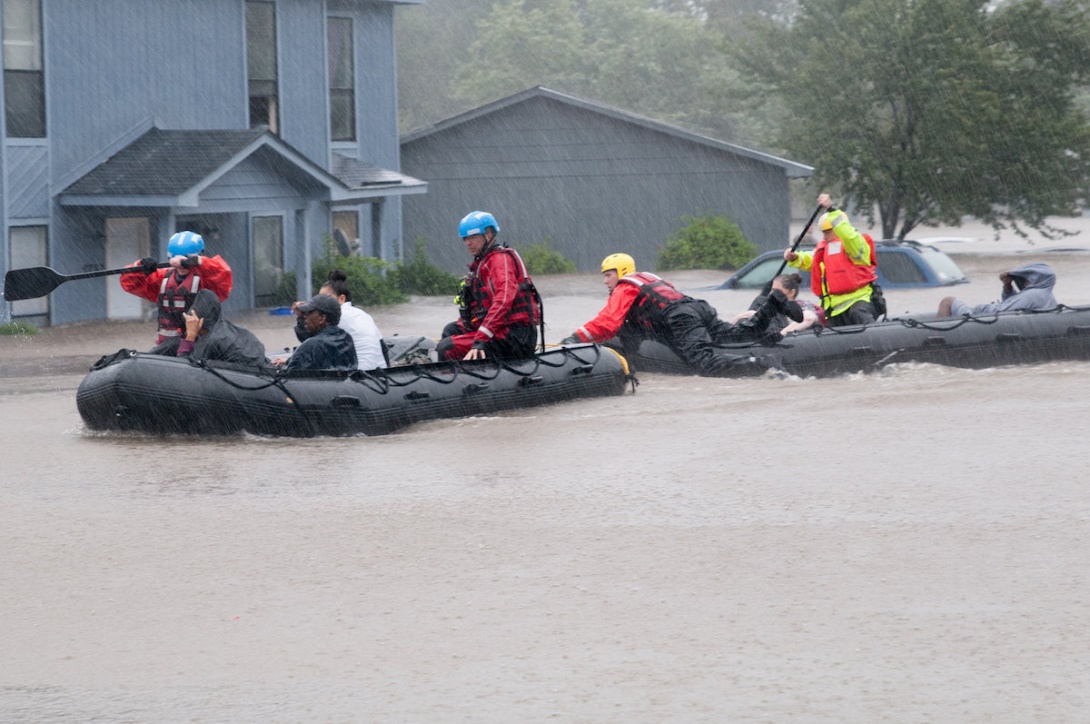Lawsuits extend voter registration deadlines in Hurricane Matthew-affected states

Swift water rescue teams evacuate people from Hurricane Matthew's floodwaters in Fayetteville, North Carolina, on Oct. 8. Officials in that state and two others hit hard by the storm — all competitive in the presidential election — refused to voluntarily extend voter registration deadlines despite widespread storm-related disruption and displacement. (Photo from N.C. National Guard via Flickr.)
Besides killing at least 44 people in the United States and causing widespread environmental damage, Hurricane Matthew raised concerns about voting rights in hard-hit Southern states, where flooding and power outages led to closures of local elections offices as registration deadlines approached.
In South Carolina, Gov. Nikki Haley (R) voluntarily extended the state's deadline for fax, email and online voter registration from Oct. 8 to Oct. 9. She also required elections boards to accept mailed registration forms postmarked Oct. 11 or earlier.
But in three other GOP-led Southern states affected by Matthew — Florida, Georgia and North Carolina — the Democratic Party and/or voting rights advocacy groups had to sue to get voter registration deadlines extended. Florida and North Carolina are considered toss-ups in the presidential election, while Georgia leans Republican but remains competitive.
Precious time lost in Florida
Before Matthew hit Florida on Oct. 7, killing at least nine people and inflicting at least $218 million in property damage, Gov. Rick Scott (R) had declared a state of emergency. However, he opposed extending the Oct. 11 voter registration deadline, so on Oct. 9 the Florida Democratic Party sued him and Secretary of State Ken Detzner to secure an extension. Two days later, the Florida League of Women Voters and Brennan Center for Justice filed their own lawsuit seeking an extension.
U.S. District Judge Mark Walker granted a one-day extension in order to hold a hearing on Oct. 12, when he extended the registration deadline to Oct. 18. Walker called Scott's refusal to act "irrational" and "nonsensical."
"These voters have already had their lives (and, quite possibly, their homes) turned up-side down by Hurricane Matthew," Walker wrote. "They deserve a break, especially one that is mandated by the United States Constitution."
But voting rights advocates remain concerned that citizens' access to the polls may have been jeopardized. "Decades of experience tell us that the days leading up to the deadline — including the weekend — are the most crucial part of the registration calendar, and we have lost precious time," said Pamela Goodman, president of the Florida League of Women Voters.
In the presidential race, Florida is considered a toss-up state where a large voter turnout could help Democrats.
In Georgia, 'an affront to the democratic process'
Six days before Georgia's Oct. 11 voter registration deadline, Gov. Nathan Deal (R) ordered the evacuation of parts of six coastal counties, areas that are home to 500,000 people. The hurricane killed at least three people in the state and caused at least $90 million in damages so far. The elections board in Chatham County, which includes the city of Savannah, was closed from Oct. 6 until Oct. 11. Post offices, where Georgia voters can also register, were also closed during this time.
But Deal refused to extend the registration deadline, prompting the ACLU, on behalf of the state NAACP and voter outreach group WickFORCE, to sue Deal and Secretary of State Brian Kemp (R) in federal court.
The state argued that having to register new voters while also conducting early voting would "burden [its] ability to have an orderly election." Attorney Julie Ebenstein with the ACLU's Voting Rights Project called the state's position an "affront to the democratic process and to voter participation in this critical election."
On Oct. 14, the judge ordered Georgia to extend only Chatham County's deadline by four days. The ACLU sued again, seeking deadline extensions in the other five affected counties where African Americans were disproportionately affected, but lost.
Typically a solidly red state in presidential elections, Georgia is now considered only to "lean Republican."
Worries linger in hard-hit North Carolina
Matthew hit North Carolina on Oct. 8, killing 26 people in the state and causing an estimated $1.5 billion in damage. Widespread flooding after the storm displaced entire communities, including the historic African-American town of Princeville and the city of Lumberton, which has significant African-American and Lumbee Indian populations.
But North Carolina Board of Elections Executive Director Kim Strach declined to extend the voter registration period in any affected county. So on the state's registration deadline of Oct. 14, the N.C. Democratic Party sued her.
Like their counterparts in Georgia, North Carolina officials argued that extending the registration deadline would burden elections officials preparing for early voting to begin on Oct. 20. However, Superior Court Judge Donald Stephens ruled that Strach "failed to correctly exercise her discretion" in refusing to extend deadlines and granted a five-day extension in the 36 counties that were hit hardest by Matthew.
But concerns linger about the disaster's affect on voting in the state. After the extension was granted, for example, numerous county elections boards failed to advertise the changes on their websites. And while the state board set up a special Hurricane Matthew section on its website explaining the extension, it didn't include details about the extension on its generic "election information" page.
North Carolina is also considered a toss-up state in the presidential contest, and close races there for U.S. Senate and governor make it one of the country's most critical battlegrounds.
Tags
Alex Kotch
Alex is an investigative journalist based in Brooklyn, New York, and a reporter for the money-in-politics website Sludge. He was on staff at the Institute for Southern Studies from 2014 to 2016. Additional stories of Alex's have appeared in the International Business Times, The Nation and Vice.com.
